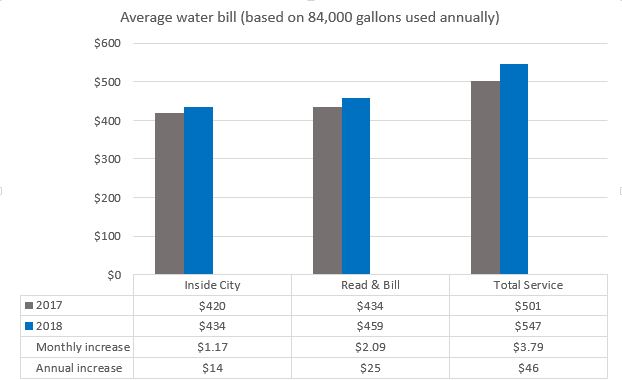
Your water bill is going up (slightly). Here’s why
Nobody likes to pay a bill.
No matter how much you like a service or how essential it may be, handing over your hard-earned money to somebody else — particularly if that bill often increases from year to year — is never fun.
But when it comes to your water bill, the simple fact is the cost of running a complex water system continues to rise. Your bill helps to maintain and upgrade a vast infrastructure that allows us to collect, treat and deliver safe, reliable water, while also providing for essential fire protection services.
You’ll see some slight increases in your water bill starting March 1, 2018. Here are the answers to four questions you may be asking:
- Why are you raising my rates?
We have a large, intricate system with a lot of aging infrastructure. With a 5-year, $1.25 billion capital plan, we’re staying on top of the upgrades and new projects needed to keep this system running.
(Watch the video at the top of the page to see the kinds of projects, like replacing failing underground storage tanks and aging pipes.)
To keep up with this necessary work, we are increasing the monthly fixed charge on your bill to help us even out our revenues over the year so we can repair and upgrade our system. This means less reliance on revenues from how much water customers use, which has become increasingly difficult to predict in recent years given the more frequent and extreme weather fluctuations. (See more in Question 4, below.)
- How much is my water bill going up?
That depends on the type of customer you are and how you use water. Your bill is comprised of a fixed monthly charge and charges for how much water you use.
Every customer will see an increase to their monthly fixed charge. If you’re like most residential customers who have a 3/4-inch meter, that charge will increase from $11.86 to $15.39 per month.
To help offset the fixed monthly charge, the charge per 1,000 gallons for many customers will see a small decrease in 2018.
Adding up those two elements, if you live in Denver and use 84,000 gallons of water a year in the same way you did in 2017, you can expect to see an annual increase of about $14, which averages out to a monthly increase of about $1.17 a month. (Summer bills are typically higher because of outdoor water use.)
If you live in the suburbs and get your water from one of our 65 distributors, your bill will be higher than Denver residents’. That’s because the Denver City Charter requires that suburban customers pay the full cost of service, plus an additional amount.
- You ask me to use less water and then raise my rates. Am I being penalized for conservation?
We always encourage conservation and the efficient use of water. In fact, rates would be higher without our customers’ conservation efforts; we’d have to build more treatment and distribution facilities to keep up with the demand for water.
For example, your conservation efforts are saving Denver Water an estimated $155 million on a new treatment plant and storage facilities because it doesn’t have to be as big as we originally estimated. That’s $155 million we don’t have to recover through rates and charges.
No one likes paying higher bills, but consider the overall value of water. Most Denver Water customers will still pay about $3 for 1,000 gallons of water.
And while rates are going up, Denver Water is committed to keeping water affordable, particularly for the essential indoor water use that is vital for drinking, cooking and sanitation. In 2018, customers will continue to pay the lowest rate for what they use indoors.
- Why is the fixed charge going up?
In 2016, Denver Water restructured the way we charge for water. While we still have a tiered pricing structure to support efficient water use — the more you use, the more you pay — we needed more revenue stability because the annual price to collect, store, treat and deliver water largely doesn’t change based on how much Denver Water customers use.
We’re now collecting around 20 percent of our rate revenue through the fixed charge. (We were collecting less than 10 percent in 2015.)
The result: A more reliable revenue stream for us and smoother, more consistent, and lower price adjustments for our customers.
When looking back at revenue increases over the years, they’ve been less than stable. For example, during a five-year stretch between 2009 and 2013, revenue increases were 9, 6, 10.4, 5.5, and 2.5 percent, respectively. When the structure changed in 2016, the revenue increase was 3.8 percent followed by two years of 3 percent increases. While customer bills still vary according to water use, the new structure fosters more stable and manageable increases.
Denver is not immune to the rise in costs associated with water scarcity, growth, climate change and infrastructure that the rest of the nation is dealing with. But, because of careful planning and an aggressive and strategic approach to upgrading infrastructure Denver water rates are significantly lower than the national average and are increasing at a slower rate.
If you’d like to talk over your bill with someone, contact Denver Water’s Customer Care team at 303-893-2444, and a representative will help you calculate your individual bill impacts, based on your personal water-use information.

